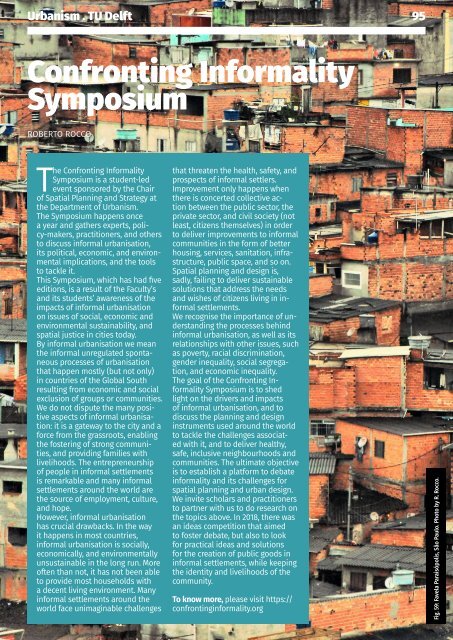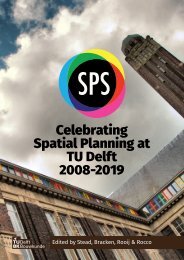*Celebrating Spatial Planning at TU Delft: 2008-2019. Edited by Stead, Bracken, Rooij & Rocco
This is a summary of the achievements of the session Spatial Planning & Strategy of the Department of Urbanism, Faculty of Architecture and the Built Environment, TU Delft, led by Professor Vincent Nadin between 2008 and 2019.
This is a summary of the achievements of the session Spatial Planning & Strategy of the Department of Urbanism, Faculty of Architecture and the Built Environment, TU Delft, led by Professor Vincent Nadin between 2008 and 2019.
You also want an ePaper? Increase the reach of your titles
YUMPU automatically turns print PDFs into web optimized ePapers that Google loves.
Urbanism . <strong>TU</strong> <strong>Delft</strong> 95<br />
Confronting Informality<br />
Symposium<br />
ROBERTO ROCCO<br />
The Confronting Informality<br />
Symposium is a student-led<br />
event sponsored <strong>by</strong> the Chair<br />
of <strong>Sp<strong>at</strong>ial</strong> <strong>Planning</strong> and Str<strong>at</strong>egy <strong>at</strong><br />
the Department of Urbanism.<br />
The Symposium happens once<br />
a year and g<strong>at</strong>hers experts, policy-makers,<br />
practitioners, and others<br />
to discuss informal urbanis<strong>at</strong>ion,<br />
its political, economic, and environmental<br />
implic<strong>at</strong>ions, and the tools<br />
to tackle it.<br />
This Symposium, which has had five<br />
editions, is a result of the Faculty’s<br />
and its students’ awareness of the<br />
impacts of informal urbanis<strong>at</strong>ion<br />
on issues of social, economic and<br />
environmental sustainability, and<br />
sp<strong>at</strong>ial justice in cities today.<br />
By informal urbanis<strong>at</strong>ion we mean<br />
the informal unregul<strong>at</strong>ed spontaneous<br />
processes of urbanis<strong>at</strong>ion<br />
th<strong>at</strong> happen mostly (but not only)<br />
in countries of the Global South<br />
resulting from economic and social<br />
exclusion of groups or communities.<br />
We do not dispute the many positive<br />
aspects of informal urbanis<strong>at</strong>ion:<br />
it is a g<strong>at</strong>eway to the city and a<br />
force from the grassroots, enabling<br />
the fostering of strong communities,<br />
and providing families with<br />
livelihoods. The entrepreneurship<br />
of people in informal settlements<br />
is remarkable and many informal<br />
settlements around the world are<br />
the source of employment, culture,<br />
and hope.<br />
However, informal urbanis<strong>at</strong>ion<br />
has crucial drawbacks. In the way<br />
it happens in most countries,<br />
informal urbanis<strong>at</strong>ion is socially,<br />
economically, and environmentally<br />
unsustainable in the long run. More<br />
often than not, it has not been able<br />
to provide most households with<br />
a decent living environment. Many<br />
informal settlements around the<br />
world face unimaginable challenges<br />
th<strong>at</strong> thre<strong>at</strong>en the health, safety, and<br />
prospects of informal settlers.<br />
Improvement only happens when<br />
there is concerted collective action<br />
between the public sector, the<br />
priv<strong>at</strong>e sector, and civil society (not<br />
least, citizens themselves) in order<br />
to deliver improvements to informal<br />
communities in the form of better<br />
housing, services, sanit<strong>at</strong>ion, infrastructure,<br />
public space, and so on.<br />
<strong>Sp<strong>at</strong>ial</strong> planning and design is,<br />
sadly, failing to deliver sustainable<br />
solutions th<strong>at</strong> address the needs<br />
and wishes of citizens living in informal<br />
settlements.<br />
We recognise the importance of understanding<br />
the processes behind<br />
informal urbanis<strong>at</strong>ion, as well as its<br />
rel<strong>at</strong>ionships with other issues, such<br />
as poverty, racial discrimin<strong>at</strong>ion,<br />
gender inequality, social segreg<strong>at</strong>ion,<br />
and economic inequality.<br />
The goal of the Confronting Informality<br />
Symposium is to shed<br />
light on the drivers and impacts<br />
of informal urbanis<strong>at</strong>ion, and to<br />
discuss the planning and design<br />
instruments used around the world<br />
to tackle the challenges associ<strong>at</strong>ed<br />
with it, and to deliver healthy,<br />
safe, inclusive neighbourhoods and<br />
communities. The ultim<strong>at</strong>e objective<br />
is to establish a pl<strong>at</strong>form to deb<strong>at</strong>e<br />
informality and its challenges for<br />
sp<strong>at</strong>ial planning and urban design.<br />
We invite scholars and practitioners<br />
to partner with us to do research on<br />
the topics above. In 2018, there was<br />
an ideas competition th<strong>at</strong> aimed<br />
to foster deb<strong>at</strong>e, but also to look<br />
for practical ideas and solutions<br />
for the cre<strong>at</strong>ion of public goods in<br />
informal settlements, while keeping<br />
the identity and livelihoods of the<br />
community.<br />
To know more, please visit https://<br />
confrontinginformality.org<br />
Fig. 59: Favela Paraisópolis, São Paulo. Photo <strong>by</strong> R. <strong>Rocco</strong>.




